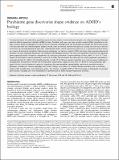Files in this item
Psychiatric gene discoveries shape evidence on ADHD's biology
Item metadata
| dc.contributor.author | Thapar, A | |
| dc.contributor.author | Martin, J | |
| dc.contributor.author | Mick, E | |
| dc.contributor.author | Arias Vásquez, A | |
| dc.contributor.author | Langley, K | |
| dc.contributor.author | Scherer, S W | |
| dc.contributor.author | Schachar, R | |
| dc.contributor.author | Crosbie, J | |
| dc.contributor.author | Williams, N | |
| dc.contributor.author | Franke, B | |
| dc.contributor.author | Elia, J | |
| dc.contributor.author | Glessner, J | |
| dc.contributor.author | Hakonarson, H | |
| dc.contributor.author | Owen, M J | |
| dc.contributor.author | Faraone, S V | |
| dc.contributor.author | O'Donovan, M C | |
| dc.contributor.author | Holmans, P | |
| dc.contributor.author | IMAGE 2 Consortium (incl Kent L) | |
| dc.date.accessioned | 2016-02-24T09:40:05Z | |
| dc.date.available | 2016-02-24T09:40:05Z | |
| dc.date.issued | 2016 | |
| dc.identifier | 240890292 | |
| dc.identifier | 61cf5267-3f52-4853-8119-fbab33b72462 | |
| dc.identifier | 26573769 | |
| dc.identifier | 84947087617 | |
| dc.identifier.citation | Thapar , A , Martin , J , Mick , E , Arias Vásquez , A , Langley , K , Scherer , S W , Schachar , R , Crosbie , J , Williams , N , Franke , B , Elia , J , Glessner , J , Hakonarson , H , Owen , M J , Faraone , S V , O'Donovan , M C , Holmans , P & IMAGE 2 Consortium (incl Kent L) 2016 , ' Psychiatric gene discoveries shape evidence on ADHD's biology ' , Molecular Psychiatry , vol. 21 , pp. 1202-1207 . https://doi.org/10.1038/mp.2015.163 | en |
| dc.identifier.issn | 1359-4184 | |
| dc.identifier.other | ORCID: /0000-0002-5315-3399/work/60195371 | |
| dc.identifier.uri | https://hdl.handle.net/10023/8291 | |
| dc.description | The Wellcome Trust, MRC and Action Medical Research have provided ADHD research support for AT, PH, JM, NW, MJO, MCO; we also acknowledge support from NIH grants R1 3MH059126, R0 1MH62873 and R0 1MH081803 to Dr SV Faraone. Dr E Mick received funding through the UMass Center for Clinical and Translational Science (P30HD004147) supported by the NIH. | en |
| dc.description.abstract | A strong motivation for undertaking psychiatric gene discovery studies is to provide novel insights into unknown biology. Although attention-deficit hyperactivity disorder (ADHD) is highly heritable, and large, rare copy number variants (CNVs) contribute to risk, little is known about its pathogenesis and it remains commonly misunderstood. We assembled and pooled five ADHD and control CNV data sets from the United Kingdom, Ireland, United States of America, Northern Europe and Canada. Our aim was to test for enrichment of neurodevelopmental gene sets, implicated by recent exome-sequencing studies of (a) schizophrenia and (b) autism as a means of testing the hypothesis that common pathogenic mechanisms underlie ADHD and these other neurodevelopmental disorders. We also undertook hypothesis-free testing of all biological pathways. We observed significant enrichment of individual genes previously found to harbour schizophrenia de novo non-synonymous single-nucleotide variants (SNVs; P=5.4 × 10-4) and targets of the Fragile X mental retardation protein (P=0.0018). No enrichment was observed for activity-regulated cytoskeleton-associated protein (P=0.23) or N-methyl-D-aspartate receptor (P=0.74) post-synaptic signalling gene sets previously implicated in schizophrenia. Enrichment of ADHD CNV hits for genes impacted by autism de novo SNVs (P=0.019 for non-synonymous SNV genes) did not survive Bonferroni correction. Hypothesis-free testing yielded several highly significantly enriched biological pathways, including ion channel pathways. Enrichment findings were robust to multiple testing corrections and to sensitivity analyses that excluded the most significant sample. The findings reveal that CNVs in ADHD converge on biologically meaningful gene clusters, including ones now established as conferring risk of other neurodevelopmental disorders. | |
| dc.format.extent | 6 | |
| dc.format.extent | 301049 | |
| dc.language.iso | eng | |
| dc.relation.ispartof | Molecular Psychiatry | en |
| dc.subject | RC0321 Neuroscience. Biological psychiatry. Neuropsychiatry | en |
| dc.subject | NDAS | en |
| dc.subject.lcc | RC0321 | en |
| dc.title | Psychiatric gene discoveries shape evidence on ADHD's biology | en |
| dc.type | Journal article | en |
| dc.contributor.institution | University of St Andrews. School of Medicine | en |
| dc.contributor.institution | University of St Andrews. Institute of Behavioural and Neural Sciences | en |
| dc.identifier.doi | https://doi.org/10.1038/mp.2015.163 | |
| dc.description.status | Peer reviewed | en |
This item appears in the following Collection(s)
Items in the St Andrews Research Repository are protected by copyright, with all rights reserved, unless otherwise indicated.

